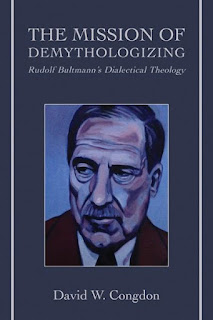Dr. Congdon and Bultmann: The Strangeness of the Gospel and Demythologizing

¶ 3 Third, Dr. Congdon has made me more aware of the alien or strange nature of the gospel. An important reason for this strangeness is the context that Jewish apocalyptic provides for understanding both Jesus and the apostolic witness contained in the gospel. Jewish apocalyptic will feel strange and alien to the person living in the technocratic, scientific, and democratic setting of today. Demythologizing as Bultmann practices it is way of addressing the nature of this strangeness. Although the theologian may disagree with the direction Bultmann takes the mission of demythologizing, it seems inescapable that the theologian, and therefore the preacher and teacher in the church, will engage in the mission of demythologizing in some form. In effect, I hope I can raise the question for the reader not so much of whether the reader demythologizes, but how and on what basis you demythologize. In the form of a reminder, Bultmann gained much scholarly attention for his work on myth ...

